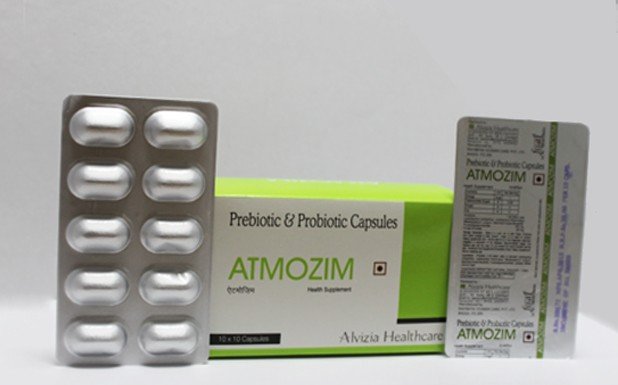
Composition
- Each Serving of 1 Capsule contains:
- Probiotics 1.25 billion cells
Fructooligosaccharides100 mg - Fungal amylase
50 mg
Packing
- 10x10
(Alu-Alu)
MRP
- 75
Overview
Prebiotics Capsules are nondigestible food components that stimulate the growth and/or activity of beneficial bacteria ("probiotics") in the colon. In other words, prebiotics are the "food" for probiotics. Probiotics are beneficial bacteria which, when consumed in adequate amounts, provide a health benefit as the result of their presence in the gastrointestinal (GI) tract. Consumption of probiotics is thought to increase the number of helpful bacteria in the GI tract, while at the same time reducing (inhibiting the growth of) harmful bacteria.
What is Atmozim and What it is Used For?
Infection & Antibiotic Associated Diarrhoea, Gastro Enteritis, Increases intestinal mucosal barrier, Rotavirus Diarrhea, In Irritable Bowel Syndrome (IBS), In Inflammatory Bowel Disease (IBD), Normalises the intestinal motility, Reduces the count of Pathogens, Boosts gut immunity.Lactobacillus Acidophilus
Lactobacillus Acidophilus which are naturally occurring beneficial bacteria, assisting the health of the intestinal tract. Lactobacillus Acidophilus maintain healthy microflora by protecting the body against an overgrowth of harmful bacteria and fungi like Candida albicans, Salmonella, E.coli and Staphylococcus aureus. Lactobacillus Acidophilus helps to Prevent Yeast Infections, Reduces Lactose Intolerance, and Decreases Antibiotic Side Effects. Lactobacillus Acidophilus implant themselves on the intestinal walls, as well as on the lining of the vagina, Cervix, and Urethra, thereby preventing other organisms from multiplying to the extent that they can cause infections.Lactobacillus Rhamnosus
Lactobacillus Rhamnosus, primarily found in the small bowel and vaginal tract. Lactobacillus rhamnosus is also believed to be bile-stable. Lactobacillus Rhamnosus adhere to the intestinal mucosa and protect the intestinal tract against the invasion of harmful microorganisms. Lactobacillus rhamnosus Helps Fight Intestinal Tract Illnesses, Suppresses Bacterial Infections in Renal Patients, Assists in Prevention of Urinary Tract Infections, Helps Build a Superior Immune System, Aids in Dairy Product Digestion among the Lactose-Intolerant, Decreases Duration of Diarrhea, and Promoting regular bowel activity.Lactobacillus Bulgaricus
Lactobacillus Bulgaricus is one of the symbiotic micro-organisms that can shrink or multiply within the environment of the mucous lining in the gastro-intestinal tract. L Bulgaricus appears to play several important roles as a soldier in this battlefield of the digestive tract. These mechanisms include reducing intestinal infections by excreting metabolic end products-- such as acids --that change the pH of the GI tract. At lower pH ranges, or higher acidic levels, it appears that many pathogens simply give up the fight to survive. Also, Lactobacillus Bulgaricus excretes natural antibiotics, which can have a broad spectrum of immune-boosting functions. Other helpful probiotic mechanisms include the blocking of pathogen adhesion sites within the mucous layer of the intestine. L Bulgaricus shows a proven ability to draw away toxins and defeat harmful bacteria.Bifidobacterium Longum
Bifidobacterium Longumis one of the most significant and important types of "good" bacteria which is found in abundance in the large intestine and vagina. The relationship between B. longum and human beings is mutually beneficial, because it maintains a normal digestive tract, inhibits the growth of harmful bacteria, and also boosts the immune system. Other benefits of B.longum include, "diarrhea prevention in antibiotic treated patients, cholesterol reduction, alleviation of lactose intolerance symptoms, immune stimulation, and cancer prevention. Supplements of Bifidobacterium longum, especially in combination with other beneficial organisms hold the best hope for preventing colon cancer and other types of digestive malignancies.Saccharomyces Boulardii
Saccharomyces boulardii is classified as being non-systemic and non-pathogenic Probiotic yeast. Saccharomyces Boulardii is resistant to gastric acidity and proteolysis and when taken orally, becomes quickly established in the gut. Saccharomyces Boulardii is known to produce lactic acid and some B vitamins. Saccharomyces Boulardii acts as a temporary flora to protect the intestinal tract and keeps intestine functioning well. Benefits of S. boulardii include control of various forms of diarrhea, decreases incidence of acute diarrhea, and reduces rate of recurrence of pseudo membranous colitis, lessens bowel movement frequency in irritable bowel syndrome patients and reduces likelihood of contracting travelers' diarrhea.Dosage
Oral:
Disclaimer:To be taken only after consulting with the doctor.
Storage
Store at room temperature, 15-30° C (59-86°F).
Keep away from moisture.